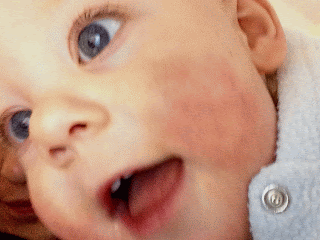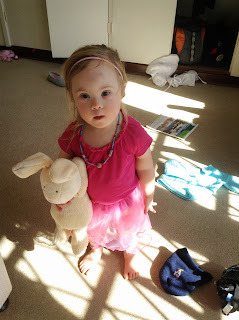Before I got married, I read every verse in the bible with the word 'love' in it. I figured this would be a good way to learn what real love is and to be able to know for certain what I wanted. it stood to reason then that when we started trying for a baby, and I was nervous we were going to have trouble falling pregnant, that I read all the verses with the word 'hope' in them. Just before I fell pregnant with Hope I wrote in my journal that 'Hope' would be a good name for a girl. I had learnt that ultimately, our real hope is in who God is....we don't always get what we hope for here on earth but that verse about how hope does not disappoint...well it is about God and His character and His promises....We place our hope in God for who He is and in His salvation, at the end of the day, that is what matters most....our eternity.
When we first heard there may be a problem but we didn't know for sure and were waiting for those 12 week blood results, God spoke to me and asked me if I wanted a child with a perfect body or a perfect soul...it was a no brainier for me and I instantly replied...soul!....sometimes I wonder what would have happened if I had said body...but it prepared me for those many months waiting to meet Hope, it carried me through...this hope in who God is, a good, loving, creator, father, protector, He knows what's best. I know that somehow for Hope (this is particular to Hope) her having Down syndrome has something to do with her soul. I don't understand what but it's important and God gave me hint so I know it's not some randomly, strange and sad occurrence. It's His number one plan for our sweet girl. We agreed to name her Hope before we even heard about the high chance of Down syndrome...what a perfect name for her! It was meant to be!
When I was pregnant with Arthur, no such amazing word from the Lord seemed forthcoming. When had a list of over a hundred names and seemed no closer to an option as the day grew closer. I felt so bad for the little unnamed boy to be arriving soon! I worried if this is how it would always be for him, would his sister get all the special attention and would we ooh and ahh over her every move but not his?
One name had stuck in my mind because I had been looking for names that meant guardian or protector because somehow I felt that despite it sounding bad, he actually would have to be that for Hope one day. We went in with a list of five names on the day of his birth, Arthur was last on the list, Jed was the top because Bryan wanted Jed I Johnston (sigh ...the joys of being married to a Star Wars nut). The minute Arthur was born, both Bryan and I took one look and separately, without telling each other till an hour later, decided that he did not look like a Jed (what a relief)... We spent 45 minutes debating between Joshua and Arthur and in the end despite feeling it was weird, different and old fashioned we looked at each other and said "well he really does seem to be an Arthur!".
How amazing that Arthur means protector of the bear, and Hope's middle name Uraula means "little bear"! I think God pulled a fast one on us :)
As I watched them throwing a ball to each other yesterday, giggling hysterically as they roll around on the floor trying to get toys out from under beds in the morning and as I listened to them charging round and round a chair for ages this afternoon with peals of laughter....I feel blessed, and not just because of my lovely children, but because I know God has a special plan for each of them and it's better for their eternity than I can imagine!









